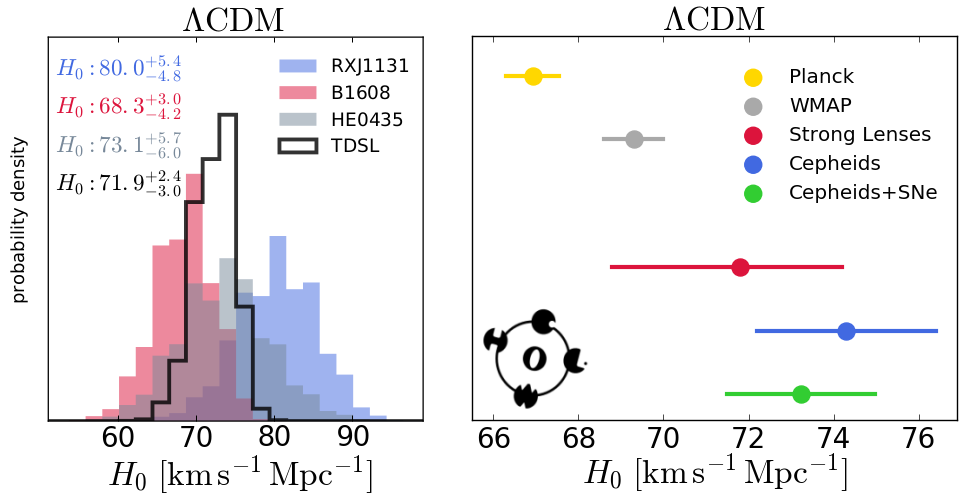ESA Hubble Science Release | 2017 Jan 26
By using galaxies as giant gravitational lenses, an international group of astronomers using the NASA/ESA Hubble Space Telescope have made an independent measurement of how fast the Universe is expanding. The newly measured expansion rate for the local Universe is consistent with earlier findings. These are, however, in intriguing disagreement with measurements of the early Universe. This hints at a fundamental problem at the very heart of our understanding of the cosmos.
The Hubble constant — the rate at which the Universe is expanding — is one of the fundamental quantities describing our Universe. A group of astronomers from the H0LiCOW collaboration, led by Sherry Suyu (associated with the Max Planck Institute for Astrophysics in Germany, the ASIAA in Taiwan and the Technical University of Munich), used the NASA/ESA Hubble Space Telescope and other telescopes in space and on the ground to observe five galaxies in order to arrive at an independent measurement of the Hubble constant.
The new measurement is completely independent of — but in excellent agreement with — other measurements of the Hubble constant in the local Universe that used Cepheid variable stars and supernovae as points of reference [heic1611].
However, the value measured by Suyu and her team, as well as those measured using Cepheids and supernovae, are different from the measurement made by the ESA Planck satellite. But there is an important distinction — Planck measured the Hubble constant for the early Universe by observing the cosmic microwave background.
While the value for the Hubble constant determined by Planck fits with our current understanding of the cosmos, the values obtained by the different groups of astronomers for the local Universe are in disagreement with our accepted theoretical model of the Universe. “The expansion rate of the Universe is now starting to be measured in different ways with such high precision that actual discrepancies may possibly point towards new physics beyond our current knowledge of the Universe,” elaborates Suyu. ...
Cosmic Lenses Bring the Universe's Expansion into Sharper Focus
Subaru Telescope | National Astronomical Observatory of Japan | 2017 Jan 26
Cosmic lenses support finding on faster than expected expansion of the Universe
Max Planck Institute for Astrophysics | 2016 Jan 26
H0LiCOW I. H0 Lenses in COSMOGRAIL's Wellspring: Program Overview - Sherry H. Suyu et al
- arXiv.org > astro-ph > arXiv:1607.00017 > 30 Jun 2016 (v1), 22 Jan 2017 (v2)
of the strong gravitational lens system HE0435-1223 - Dominique Sluse et al
- arXiv.org > astro-ph > arXiv:1607.00382 > 01 Jul 2016 (v1), 24 Jan 2017 (v2)
gravitational lens HE 0435-1223 through weighted galaxy counts - Cristian E. Rusu et al
- arXiv.org > astro-ph > arXiv:1607.01047 > 04 Jul 2016
of its time-delay distance for cosmology - Kenneth C. Wong et al
- arXiv.org > astro-ph > 1607.01403 > 05 Jul 2016 (v1), 19 Dec 2016 (v2)
precision from strong lensing in a flat ΛCDM model - Vivien Bonvin et al
- arXiv.org > astro-ph > arXiv:1607.01790 > 06 Jul 2016 (v1), 25 Jan 2017 (v2)
- arXiv.org > astro-ph > arXiv:1610.08504 > 26 Oct 2016


